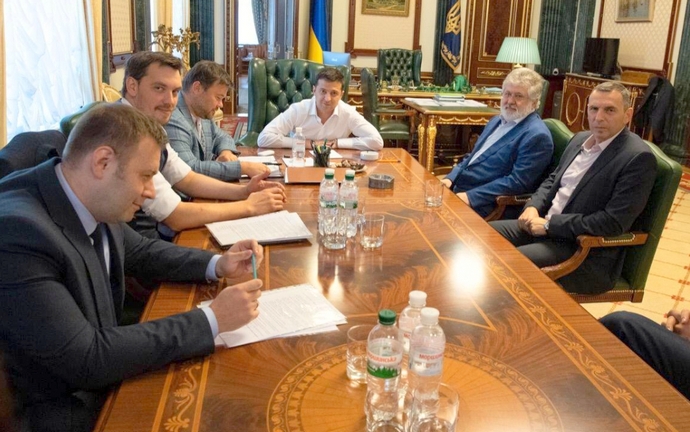On 13 May 2020, the Ukrainian Parliament made a historical decision by supporting in the second reading the new banking law, dubbed in the media as the “Anti-Kolomoiskyi Bill,” referring to the oligarch Ihor Kolomoiskyi. Passing the bill plays two significant roles for Ukraine. First, it opens the door for the crucial International Monetary Fund (IMF) loan. Second, it deprives one of the country’s main oligarchs of the opportunity to manipulate the state over the issue of Privatbank, Kolomoiskyi’s bank which was nationalized in 2016.
Passing this banking bill was the last condition for Ukraine to implement to continue cooperation with the IMF. Taking this into consideration, President Volodymyr Zelenskyy attended the Parliamentary session himself, insisting MPs support the bill which “has to defend Ukraine’s economy and help Ukraine right now.”
More than a month has passed between the first and second readings. Kolomoiskyi’s opposition was strong — his loyal MPs initiated some 16,000 amendments.
Why does the bill refer to Kolomoiskyi?

To a large extent, the purpose of the bill is to prevent the possible return of the nationalized bank Privat to Kolomoiskyi, as well as to nullify payment to him of multi-millions in compensation.
Privatbank — the country’s largest bank in terms of total assets — owned by oligarchs Ihor Kolomoiskyi and Hennadiy Boholiubov, was seized and nationalized during the night of 20 December 2016.
Predictably, under government pressure Kolomoiskyi did return a segment of his assets, for which he aims to receive compensation amounting to $2 bn (about UAH 55 bn). The IMF, in its turn, intends to bring Kolomoiskyi to justice for personally absconding UAH 155 bn (about $5.5 bn) from PrivatBank.
Considering the IMF an opponent, Kolomoyskii himself — and through his MP sycophants — is promoting the narrative that defaulting on loans is the right solution for Ukraine, and that the IMF will prove to be a yoke to the nation.
“Amendments terrorism” between the two readings
On 30 March, 267 MPs voted for the bill in the first reading. However, progressing to the second vote was not easy, since a number of MPs went down the path of filibustering, by submitting some 16,000 amendments, which rendered it impossible to pass the bill any time soon.
The majority of amendments were made by the Servant of the People MPs associated with Kolomoiskyi. One of them, Anton Poliakov, made 6,000 amendments himself. Although the oligarch denied any involvement in the amendments, he called the bill not anti-Kolomoiskyi, but anti-Ukrainian.
According to regular procedures, any amendments to a bill must first be considered by the relevant committee. Only then, and if the author of the amendments insists, Parliament needs to vote for each of them individually.
Under these conditions, any consideration of the bill would be delayed for several months. Ruslan Stefanchuk, the Deputy Head of the Parliament went so far as to call the situation “amendments terrorism.”
The Financial Committee was able to consider all the amendments in just four days, recommending that MPs support the bill in the second reading.
However, to avoid the need for all of Parliament to undergo what would be an unreasonably lengthy process that would last many months, a special solution was needed. In mid-April, MPs finally agreed to support a change to its regulations that foresees a special procedure for consideration of bills, in the event of an excessive number of amendments in the second reading.
Dmytro Razumkov, Parliament’s speaker stated that the changes to the regulations will be applicable during the quarantine, plus another 30 days.
Regarding the anti-Kolomoiskyi bill, the new regulations helped to reduce the number of amendments for consideration in the second reading to 241.
The essence of the bill: making it impossible for owners of insolvent banks to return them

The main purpose of the law is to make it impossible for an owner of a bank that was withdrawn from the market due to its insolvency to return it. The owner can be eligible for compensation for losses, but only when proving that at the time of withdrawal from the market there remained capital.
- If the ex-owners of the bank have received compensation for damage caused by the illegal classification of the bank as insolvent, revocation of the bank's license, or liquidation of the bank, are not released "from civil, administrative or criminal liability for their actions."
- The lost profit is reimbursed "in the amount of income that a bank member could actually receive," if the National Bank has not decided to liquidate the financial institution. Lost profit is reimbursed only if such benefit was not taken into account, when assessing actual losses (share value).
- Real losses are determined in the amount of the value of the bank's shares on the day of the National Bank's decision to classify the bank as insolvent or revoke the banking license and liquidate the bank (settlement day).
- The value of shares is determined in the report on the state of financial and economic activity of the bank, prepared by an internationally recognized auditing firm that meets the criteria set by the National Bank of Ukraine. Such assessment of the financial and economic activities of the bank and the value of shares is appointed by the court, which considers the case of compensation for damage.
- The court may not reject the auditor's report on the state of the bank.
- An appeal against a decision, act, or action of the National Bank shall not suspend their execution. Courts can not suspend the National Bank’s decisions in securing a lawsuit.
Prior to the passing of the bill, On 7 May, a representative of the IMF, Gerry Rice, stated that Ukraine and the IMF, during negotiations on a new cooperation program, refused the previously agreed upon, three-year program of expanded financing EFF, and replaced it with an 18-month standby program.
"When the situation resolves, the focus may again shift to solving the problems of long-term structural reforms in Ukraine in order to promote stronger and more inclusive growth,” he said.
Matti Maasikas, the head of the EU Delegation to Ukraine has already welcomed passing the bill, calling it “a vital measure to protect public finances and Ukrainian taxpayers.”
Meanwhile, the author of the 6,000 amendments, Poliakov, registered a decree in Parliament to cancel the voting.
Read also:
- Ukrainian parliament approves at first reading bill against oligarch Kolomoiskyi to receive IMF loan
- Ex-National Bank director’s house burns as deal suspected between Zelenskyy and top Ukrainian oligarch
- What Ihor Kolomoiskyi hopes for in the last battle of Ukrainian oligarchs
- Oligarchic shadow of Ukraine’s 2019 elections
- In Ukraine, oligarchs set the election agenda using their TV
- Russian oligarchs in Europe: soccer, churches, and working for the Kremlin





